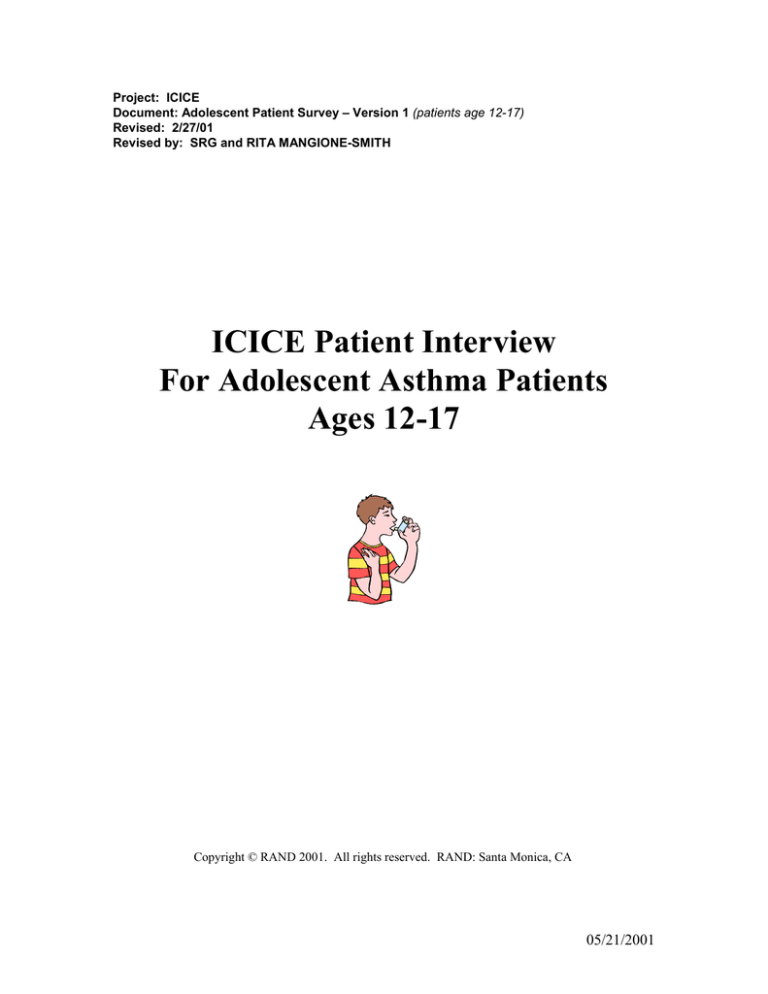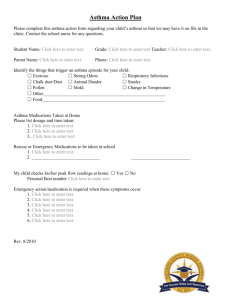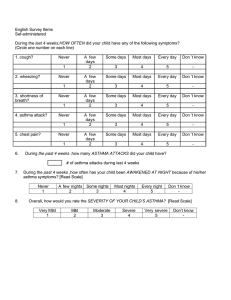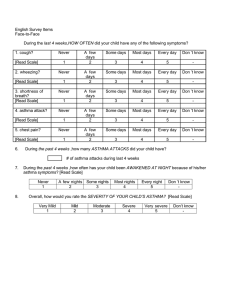
Project: ICICE
Document: Adolescent Patient Survey – Version 1 (patients age 12-17)
Revised: 2/27/01
Revised by: SRG and RITA MANGIONE-SMITH
ICICE Patient Interview
For Adolescent Asthma Patients
Ages 12-17
Copyright © RAND 2001. All rights reserved. RAND: Santa Monica, CA
05/21/2001
~~~~~~~~~~~~~~~~~~~~~~~~~~~~~~~~~~~~~~~~~~~~~~~~~~~~~~~~~~~~~~~~~~~~~~~~~~~~~~
INTRODUCTION OF STUDY TO RESPONDENT
~~~~~~~~~~~~~~~~~~~~~~~~~~~~~~~~~~~~~~~~~~~~~~~~~~~~~~~~~~~~~~~~~~~~~~~~~~~~~~
>intr<
Hello, my name is [FIRST AND LAST NAME]. Is this [CHILD’s NAME] I’m speaking with?
I work for a survey research center at a place called RAND in California. We’re doing a study of young
people from all over the United States who have asthma. We’d like to learn more about how your asthma
is affecting you and how your doctor might be able to care for your asthma even better than he or she
already does.
I just finished asking your (mom/dad/other guardian) some questions about your asthma. If you wouldn’t
mind, I’d like to spend a few minutes talking with you about your asthma. I’d like to ask you some
questions about how you care for your asthma and how it affects you day-to-day. It would add a lot to
what we can learn about teens with asthma and the care they get for it if we can combine what you tell us
with the information your (mom/dad/other guardian) already gave us.
Of course the decision to take part or not is completely up to you. We can stop talking whenever you want
or you can refuse to answer a question at any time. Talking to me about your asthma will not change the
way your doctor treats you at all. We will keep your answers secret from your doctor. When we tell
doctors and other people what we find out from doing this study, we will only tell them about the results for
all young people as a group. We would never report anything about just you. If you decide to take part,
we would like to send you a $10 gift certificate to thank you for helping us with this study. Would it be OK
with you if I ask you some questions about your asthma now?
For all respondents, who say they don’t have sampled condition:
>noint <
We’ll check our records again. Another interviewer may call you back in the next week or so to
follow-up.
[CASE GOES TO SUPERVISOR FOR REVIEW AND VERIFICATION]
B. Adherence
B0. Do you have a peak flow meter at home?
DEFINITION: This is where you blow air as hard as you can into a tube that
how bad your asthma is by giving you a number, like 150 or 200.
B1.
1
Yes
5
No Æ Skip to B3
measures
Do you check your peak flows at home?
DEFINITION: This is where you blow air as hard as you can into a tube that measures how
bad your asthma is by giving you a number, like 150 or 200.
1
Yes
5
No Æ Skip to B3
1
B2.
During the last 4 weeks, how often did you check your peak flows at home? Was it:
1
2
3
4
5
B3.
Never
Less than once a week
A few times per week
Once a day, or
Twice a day or more?
Some people with asthma take daily, inhaled medications to help keep their asthma under
control. For example, they use a long-acting inhaler like Vanceril or Beclovent. Is this
something your doctor has prescribed for you?
DEFINITION: A long-acting inhaler contains longer-lasting asthma medicine that you
“puff” or inhale. This type of medicine helps to keep you from having breathing problems
or asthma attacks before they start and is often used on a daily basis.
INTERVIEWER: IF R MENTIONS CORTISONE INHALER, SAY: “Think of your
cortisone inhaler as you answer these next few questions.”
1 Yes
5 No Æ Skip to C1
3 Not Sure
B4.
I need to know which kind of long-acting inhaler your doctor prescribed. Can you tell me
what color it is? (I can wait while you go get it.)
1 Name or colors match long-acting inhalers on sheet
2 Name or colors match fast-acting inhalers on sheet
3
Name or colors do not match any inhaler on sheet
(Enter Name/Colors: _________________________________________________ )
LONG-ACTING INHALERS TO BE COUNTED IN B4:
COLOR
MEDICATION NAME
GRAY WITH A
PURPLE CAP
AEROBID
(ARROW-BID)
LIGHT GREEN WITH
A DARK GREEN CAP
AEROBID
(ARROW-BID)
WHITE WITH WHITE
CAP
AZMACORT
(ASTHMA-COURT)
TAN WITH A BROWN
CAP
BECLOVENT
(BECK-LOW-VENT)
DARK ORANGE
WITH A LIGHT
ORANGE CAP.
FLOVENT
(FLOW-VENT)
WHITE AND BROWN
TUBE
PULMICORT
(PUHL-MIH-COURT)
PINK WITH A
PURPLE CAP
VANCERILL
(VAN-SIR-ILL)
2
COLOR
MEDICATION NAME
WHITE WITH WHITE
CAP
ALBUTEROL
(AL-BEW-TER-ALL)
LIGHT BLUE WITH
DARK BLUE CAP
ALBUTEROL
(AL-BEW-TER-ALL)
OR
VENTOLIN
(VEN-TOE-LIN)
CLEAR WITH BLUE
CAP
ALUPENT
(AL-YOU-PENT)
WHITE WITH BLUE
CAP
ALUPENT
(AL-YOU-PENT) OR
INTAL
(IN-TALL)
CLEAR WITH
GREEN CAP
ATROVENT
(AT-ROW-VENT)
WHITE WITH GREEN
CAP
ATROVENT
(AT-ROW-VENT)
YELLOW WITH AN
ORANGE CAP
PROVENTILL
WHITE WITH GREEN
LETTERS ON TUBE
AND CAP
TILADE
(PRO-VENT-ILL)
(TIE-LADE)
B5. Over the last 4 weeks, how often were you able to use your inhalers the way your doctor or
nurse told you to? Was it:
1
2
3
4
Never
Sometimes
Usually
Always
C. Self-Efficacy and Perceived Control
REF: Adapted from: Katz PP, Yelin EH, Smith S, Blanc PD. Perceived Control of Asthma:
Development and Validation of a Questionnaire. American Journal of Respiratory
Critical Care Medicine Feb. 1997; 155(2):577-82.
I’m going to read you some statements about you and your asthma. For each one, tell me how
much you disagree or agree with the statement.
C1.
If I do all the right things, I can control my asthma. Do you:
1 Disagree
2 Agree
3 Are you not sure
3
REF: C2 through C9: Adapted from: Bursch, B., Schwankovsky, L., Gilbert, J., Zeiger, R.
Construction and Validation of Four Childhood Asthma Self-Management Scales:
Parent Barriers, Child and Parent Self-Efficacy, and Parent Belief in Treatment
Efficacy. Journal of Asthma 1999; 36(1):115-128.
C2.
I know the right way to take my asthma medications. Do you:
1 Disagree
2 Agree
3 Are you not sure
C3.
I know how to stop myself from having a serious breathing problem. Do you:
1 Disagree
2 Agree
3 Are you not sure
C4.
It is hard to avoid things I am allergic to. Do you:
1 Disagree
2 Agree
3 Are you not sure
C5.
It is hard to ask someone who is smoking near me to stop. Do you:
1 Disagree
2 Agree
3 Are you not sure
C6.
I know when my breathing problems are serious enough to go to the emergency room. Do
you:
1 Disagree
2 Agree
3 Are you not sure
C7.
Once I start wheezing and coughing it is hard for me to keep my symptoms from getting
worse. Do you:
1 Disagree
2 Agree
3 Are you not sure
C8.
It’s hard for me to stay calm when I’m having a serious breathing problem. Do you:
1 Disagree
2 Agree
3 Are you not sure
C9.
I know which inhalers to use when I’m having a serious breathing problem. Do you:
1 Disagree
2 Agree
3 Are you not sure
4
C10. Sometimes I don’t take my asthma medicine because I worry about side effects. Do you:
DEFINITION OF SIDE EFFECTS: Medicines that help your asthma can sometimes cause
things like stomach aches, headaches, or make you sleepy.
1 Disagree
2 Agree
3 Are you not sure
D. Knowledge
REF: All items adapted or taken directly from: National Asthma Education Program, Office
of Prevention, Education, and Control, National Heart, Lung, and Blood Institute.
Bethesda, MD: National Institutes of Health, Publication No. 91-3042, August 1991.
I’d like to find out about how much you know about asthma and treatment of asthma.
D1.
Long-acting inhalers (like Vanceril or Flovent) are for quick relief of coughing or problems
breathing. Do you:
1 Disagree
2 Agree
3 Are you not sure
D2.
Asthma attacks are not really harmful or dangerous. Do you:
1 Disagree
2 Agree
3 Are you not sure
D3.
Asthma attacks usually occur suddenly without warning. Do you:
1 Disagree
2 Agree
3 Are you not sure
D4.
Many different things can bring on an asthma attack. Do you:
1 Disagree
2 Agree
3 Are you not sure
D5.
Asthma cannot be cured, but it can be controlled. Do you:
1 Disagree
2 Agree
3 Are you not sure
D6.
People with asthma cannot monitor how well their lungs are working. Do you:
1 Disagree
2 Agree
3 Are you not sure
D7.
Smoking or being around someone who is smoking can make asthma worse. Do you:
1 Disagree
2 Agree
3 Are you not sure
5
D8.
People with asthma should not exercise. Do you:
1 Disagree
2 Agree
3 Are you not sure
D9.
Avoiding things like animal air or dust is helpful in preventing asthma attacks. Do you:
1 Disagree
2 Agree
3 Are you not sure
D10.
Staying calm will help keep a serious breathing problem from getting worse. Do you:
1 Disagree
2 Agree
3 Are you not sure
E. Health Related Quality of Life
REF: E1-E15: PedsQL (Pediatric Quality of Life Inventory), Teen Report (ages 13-18),
Version 4 Short Form (SF15); Copyright 1998 JW Varni, PhD. Address
correspondence to: James W. Varni, PhD, Professor and Senior Scientist, Center
for Child Health Outcomes, Children’s Hospital and Health Center, 3020 Children’s
Way, San Diego, CA 92123.
The next questions are about things that might be a problem for you during the past month.
Keep in mind there are no right or wrong answers.
E1.
During the past month, has it been hard for you to walk more than one block:
1
2
3
E2.
4 Often
5 Almost always
Never
Almost never
Sometimes
4 Often
5 Almost always
During the past month, has it been hard for you to lift something heavy:
1
2
3
E5.
Never
Almost never
Sometimes
During the past month, has it been hard for you to do sports activity or exercise:
1
2
3
E4.
4 Often
5 Almost always
During the past month, has it been hard for you to run:
1
2
3
E3.
Never
Almost never
Sometimes
Never
Almost never
Sometimes
4 Often
5 Almost always
During the past month, has it been hard for you to do chores around the house:
1
2
3
Never
Almost never
Sometimes
4 Often
5 Almost always
6
E6.
During the past month, have you felt afraid or scared:
1
2
3
E7.
Never
Almost never
Sometimes
4 Often
5 Almost always
Never
Almost never
Sometimes
4 Often
5 Almost always
Never
Almost never
Sometimes
4 Often
5 Almost always
Never
Almost never
Sometimes
4 Often
5 Almost always
During the past month, have you forgotten things (in school):
1
2
3
E15.
4 Often
5 Almost always
During the past month, has it been hard for you to pay attention in class:
1
2
3
E14.
Never
Almost never
Sometimes
During the past month, have you been teased by people your age?
1
2
3
E13.
4 Often
5 Almost always
During the past month, have people your age not wanted to be your friend:
1
2
3
E12.
Never
Almost never
Sometimes
During the past month, have you had trouble getting along with people your age:
1
2
3
E11.
4 Often
5 Almost always
During the past month, have you worried about what will happen to you:
1
2
3
E10.
Never
Almost never
Sometimes
During the past month, have you felt angry:
1
2
3
E9.
4 Often
5 Almost always
During the past month, have you felt sad or blue:
1
2
3
E8.
Never
Almost never
Sometimes
Never
Almost never
Sometimes
4 Often
5 Almost always
During the past month, have you had trouble keeping up with your schoolwork:
1
2
3
Never
Almost never
Sometimes
4 Often
5 Almost always
7
These next questions are about asthma symptoms you may have had in the past month.
REF: E16-E38: PedsQL (Pediatric Quality of Life Inventory), Asthma Module, Teen Report
(ages 13-18), Version 3 Short Form (SF22); Copyright 1998 JW Varni, PhD.
Address correspondence to: James W. Varni, PhD, Professor and Senior Scientist,
Center for Child Health Outcomes, Children’s Hospital and Health Center, 3020
Children’s Way, San Diego, CA 92123.
E16.
During the past month, has your chest hurt or felt tight:
1
2
3
E17.
4 Often
5 Almost always
Never
Almost never
Sometimes
4 Often
5 Almost always
Never
Almost never
Sometimes
4 Often
5 Almost always
Never
Almost never
Sometimes
4 Often
5 Almost always
During the past month, have you had a stuffy or runny nose:
1
2
3
E24.
Never
Almost never
Sometimes
During the past month, has it been hard for you to take a deep breath:
1
2
3
E23.
4 Often
5 Almost always
During the past month, have you coughed:
1
2
3
E22.
Never
Almost never
Sometimes
During the past month, have you gotten out of breath:
1
2
3
E21.
4 Often
5 Almost always
During the past month, have you gotten scared when you have asthma attacks:
1
2
3
E20.
Never
Almost never
Sometimes
During the past month, have you had asthma attacks:
1
2
3
E19.
4 Often
5 Almost always
During the past month, have you felt wheezy:
1
2
3
E18.
Never
Almost never
Sometimes
Never
Almost never
Sometimes
4 Often
5 Almost always
During the past month, have you woken up during the night with trouble breathing or
coughing:
1
2
3
Never Æ Skip to E26
Almost never
Sometimes
4 Often
5 Almost always
8
E25.
About how many nights (in the past month) did that happen?
ENTER # NIGHTS: _____________ (0-31) Æ Skip to E26
d Don’t Know
r Refuse Æ Skip to E26
E25A. Was it:
1
2
E26.
Less than 3 nights
3 to 4 nights
3
4
5 to 10 nights
More than 10 nights
During the past month, has it been hard for you to play with pets:
1 Never
2 Almost never
3 Sometimes
4
5
n
Often
Almost always
R volunteers: I don’t play with any pets. Æ Skip to E26b
[If E26 = 1 Æ Skip to E26a]
E26a.
Do you ever play with pets?
1 Yes
2 No
E26b.
Æ Skip to E27
Is that because of your asthma?
1 Yes
2 No
E27.
During the past month, has it been hard for you to play outside:
1
2
3
E28.
4 Often
5 Almost always
Never
Almost never
Sometimes
4 Often
5 Almost always
During the past month, have you had trouble using your inhaler:
1
2
3
E31.
Never
Almost never
Sometimes
During the past month, have you had trouble sleeping because of your medicines:
1
2
3
E30.
4 Often
5 Almost always
During the past month, have your medicines made you feel sick:
1
2
3
E29.
Never
Almost never
Sometimes
Never
Almost never
Sometimes
4 Often
5 Almost always
During the past month, have you not liked to carry your inhaler:
1
2
3
Never
Almost never
Sometimes
4 Often
5 Almost always
9
E32.
During the past month, has it been hard for you to be responsible for your medicines:
1
2
3
E33.
4 Often
5 Almost always
Never
Almost never
Sometimes
4 Often
5 Almost always
Never
Almost never
Sometimes
4 Often
5 Almost always
During the past month, have you gotten scared when you have to go to the doctor:
1
2
3
E38.
Never
Almost never
Sometimes
During the past month, have you gotten scared when you have to have medical
treatments:
1
2
3
E37.
4 Often
5 Almost always
During the past month, have you forgotten to take your medicines:
1
2
3
E36.
Never
Almost never
Sometimes
During the past month, have you decided not to take your medicines:
1
2
3
E35.
4 Often
5 Almost always
During the past month, has it been hard for you to control your asthma:
1
2
3
E34.
Never
Almost never
Sometimes
Never
Almost never
Sometimes
4 Often
5 Almost always
During the past month, have you gotten scared when you have to go to the hospital:
1
2
3
Never
Almost never
Sometimes
4 Often
5 Almost always
F. Asthma Related Symptoms, Disease Control, and Severity
REF: F4-F7 - New items created using severity criteria outlined in the NHLBI Practical
Guide for the Diagnosis and Management of Asthma, Based on the Expert Panel
Report 2: Guidelines for the Diagnosis and Management of Asthma. U.S. Department
of Health and Human Services, National Institutes of Health, National Heart, Lung,
and Blood Institute. Bethesda, MD: NIH Publication No. 97-4053; p. 10, Figure 3, and
p. 13, Figure 6, October 1997.
These next questions ask about how your asthma symptoms have been in the past 4 weeks.
F1.
During the past 4 weeks, have you had more asthma symptoms at home or at school?
1
2
3
Home
School
Equal at both
10
F2.
During the past 4 weeks, about how many days of school did you miss because of your
asthma?
# Days (0-20): _______ Æ Skip to F4
d Don’t Know
F3.
Would you say:
0
1
2
3
F4.
During the past week, on how many days did you have asthma symptoms during the
daytime? Was it:
4
5
6
7
F5.
No days
Less than 3 days
3 to 6 days
Every day
No days
Less than 3 days
3 to 6 days
Every day
During the past week, did you use a fast acting or quick relief medication (like Albuterol,
Ventolin, Proventil) from an inhaler (or a nebulizer)?
DEFINITION: Fast acting inhalers contain medication that you “puff” or inhale to get quick
relief from coughing or breathing problems.
1 Yes
2 No Æ Skip to F8
3 Not Sure Æ Skip to F8
F6.
In the past week, about how many times each day did you use fast acting or quick relief
medication?
0
1
2
3
4
F7.
Not at all
1 to 2 times
3 times
4 to 6 times
More than 6 times
I need to know which kind of fast acting or quick relief inhaler you used. Can you tell me
what color it is? (I can wait while you go get it.)
1 Name or colors match fast-acting inhalers listed on sheet.
2 Name or colors match long-acting inhalers listed on sheet.
3 Name or colors do not match any inhaler listed on sheet.
(Enter Name/Colors: ___________________________________________)
11
FAST ACTING/QUICK RELIEF INHALERS TO BE COUNTED IN F7
COLOR
MEDICATION NAME
WHITE WITH WHITE
CAP
ALBUTEROL
(AL-BEW-TER-ALL)
LIGHT BLUE WITH
DARK BLUE CAP
ALBUTEROL
(AL-BEW-TER-ALL)
QXQ ISSUE: CAN’T
DISTINGUISH FROM
AZMACORT, SO GIVE
CREDIT IN F11
OR
VENTOLIN
(VEN-TOE-LIN)
CLEAR WITH BLUE
CAP
ALUPENT
(AL-YOU-PENT)
WHITE WITH BLUE
CAP
ALUPENT
(AL-YOU-PENT) OR
INTAL
(IN-TALL)
CLEAR WITH GREEN
CAP
ATROVENT
(AT-ROW-VENT)
WHITE WITH GREEN
CAP
ATROVENT
(AT-ROW-VENT)
YELLOW WITH AN
ORANGE CAP
PROVENTILL
(PRO-VENT-ILL)
WHITE WITH GREEN
LETTERS ON TUBE
AND CAP
TILADE
(TIE-LADE)
LONG-ACTING INHALERS SHOULD NOT BE COUNTED IN F7:
COLOR
MEDICATION NAME
GRAY WITH A PURPLE
CAP
AEROBID
(ARROW-BID)
LIGHT GREEN WITH A
DARK GREEN CAP
AEROBID
(ARROW-BID)
WHITE WITH WHITE
CAP
AZMACORT
(ASTHMA-COURT)
TAN WITH A BROWN
CAP
BECLOVENT
(BECK-LOW-VENT)
DARK ORANGE WITH
A LIGHT ORANGE CAP.
FLOVENT
(FLOW-VENT)
WHITE AND BROWN
TUBE
PULMICORT
(PUHL-MIH-COURT)
PINK WITH A PURPLE
CAP
VANCERILL
(VAN-SIR-ILL)
12
F8.
During the past 6 months, have you had to miss any overnight camping trips or
sleepovers at a friend’s house because you had breathing problems at night?
1 Yes
F9.
5 No
In the past 6 months, did you have an asthma attack that was so bad you had to see a
see a doctor that same day?
1 Yes
5 No
Now I’m going to ask some questions about health care you may have had.
F10.
Have you ever had to stay overnight in the hospital because of your asthma?
1 Yes
F11.
5 No Æ Skip to G1
Have you ever been put on a ventilator where the doctors had to put a tube down your
throat and a machine had to breathe for you?
1 Yes
5 No
G. Satisfaction with Care
I’m going to read you some statements about your doctors and health care. For each one, tell me
how much you disagree or agree with the statement.
REF: G1-G7 Adapted from: Litt, I.F., Cuskey, W.R. Satisfaction with Health Care: A
Predictor of Adolescents’ Appointment Keeping. Journal of Adolescent Health Care
5:196-200, 1984.
G1.
I spend too much time waiting before seeing my doctor. Do you:
1 Disagree,
2 Agree
3 Are you not sure?
G2.
My doctors aren’t as thorough as they should be.
1 Disagree,
2 Agree
3 Are you not sure?
G3.
There are things about the health care I get for my asthma that could be better.
1 Disagree,
2 Agree
3 Are you not sure?
G4.
The care I get from [fill PROVIDER] is better than care I have had at other clinics or
doctors’ offices.
1 Disagree,
2 Agree
3 Are you not sure?
G5.
My doctors hardly ever explain my health problems to me.
1 Disagree,
2 Agree
3 Are you not sure?
13
G6.
My doctors are very careful to check everything when examining me.
1 Disagree,
2 Agree
3 Are you not sure?
G7.
My doctors never tell me what tests are for.
1 Disagree,
2 Agree
3 Are you not sure?
G8.
My doctors never tell me if my asthma medications can cause side effects.
DEFINITION: Medicines that help your asthma can sometimes cause things like stomach
aches, headaches, or make you sleepy.
1 Disagree,
2 Agree
3 Are you not sure?
H. Education
REF: Adapted from RAND’s ICICE Diabetes Questionnaire. Content based on information
obtained from: Practical Guide for the Diagnosis and Management of Asthma; Based
on the Expert Panel Report 2: Guidelines for the Diagnosis and Management of
Asthma. U.S. Department of Health and Human Services, National Institutes of
Health, National Heart, Lung, and Blood Institute. NIH Publication No. 97-4053;
October 1997.
These next questions are about different ways you might have learned to take care of your
asthma during the past 6 months.
H1.
(In the past 6 months) did you get a newsletter, magazine, pamphlet, videotape or anything
like that about asthma?
1 Yes
H2.
H3.
(In the past 6 months) did a doctor, nurse or other health provider teach you how to care for
your asthma?
1 Yes
5 No
(In the past 6 months) did you attend any classes or groups to learn more about asthma?
1 Yes
H4.
5 No
(In the past 6 months) did you attend any meetings or groups where you could talk with
other people your age about what it is like to have asthma?
1 Yes
H5
5 No
5 No
(In the past 6 months) did a doctor, nurse or other health provider teach you how to use a
peak flow meter?
1 Yes
5 No
n R volunteers: I have had forever/no peak flow meter.
H6.
(In the past 6 months) did a doctor, nurse, or other health provider teach you how to use
your asthma medicines?
1 Yes
5 No
n R volunteers: I have had medicines forever/no asthma medicine.
14
H7.
(In the past 6 months) did you get information about asthma from the internet or an
asthma web site?
1 Yes
H8.
5 No
Certain things like tobacco smoke, dust, pets or animal hair, cockroaches, and mold can
make asthma worse. In the past 6 months did a doctor, nurse or other health provider
talk with you about ways to avoid these kinds of things?
1 Yes
5 No
I. Demographics
These last questions are about you and your family and will help us to describe all the young
people in our study.
I1.
Do you live with someone who smokes?
1 Yes
I2.
When was the last time you smoked? Was it:
1
2
3
4
n
I3.
5 No
Today
Last week
Last month
More than a month ago
R volunteers: I never smoked/just tried it once or twice.
Did your doctor or any other health provider ever tell you smoking is especially bad if you
have asthma?
1 Yes
5 No
>kidmr<
The letter we sent your parent(s) said that we would like to put your answers from this interview
together with your health care records from [FILL SITE]. Your health care records are made up of
your medical charts, information [FILL SITE] may have about the cost of your care, prescription
medicines you have taken, test or health procedures you had at [FILL SITE], and general
information about your health insurance.
A member of our study team would look at your health care records from [FILL SITE] to learn
more about your care from [FILL SITE].
We won’t look at your health care records at [FILL SITE] without your permission and permission
from your parent(s). You can tell me if you don’t want anyone from our study team to look at your
health care records at [FILL SITE]. No matter what you decide you will still receive your $10 gift
certificate. We don’t tell your doctors at [FILL SITE] if you say yes or no, so whatever you decide
will not matter to them.
Do you give your permission for a member of the RAND study team to look at your health care
records?
1
2
3
Yes, Give permission
No, Do not give permission
Not sure at this time
>check<
Thank you for taking the time to answer these questions. We will send you a $10 gift certificate
for completing this interview.
15





